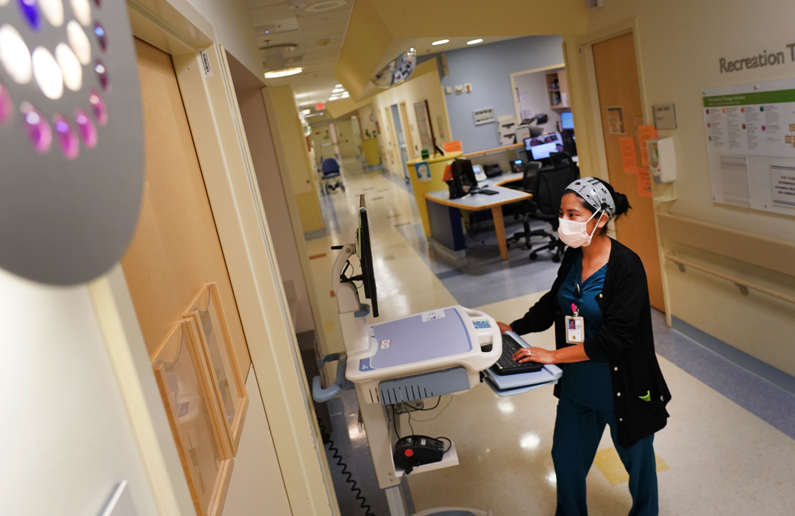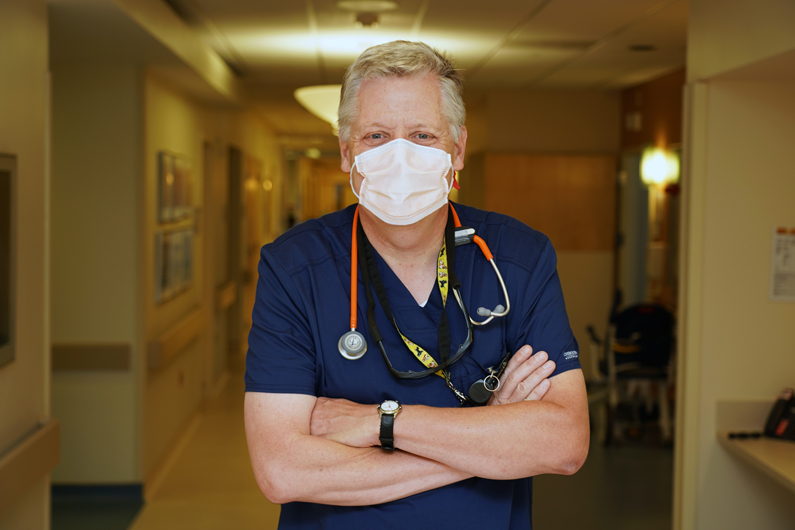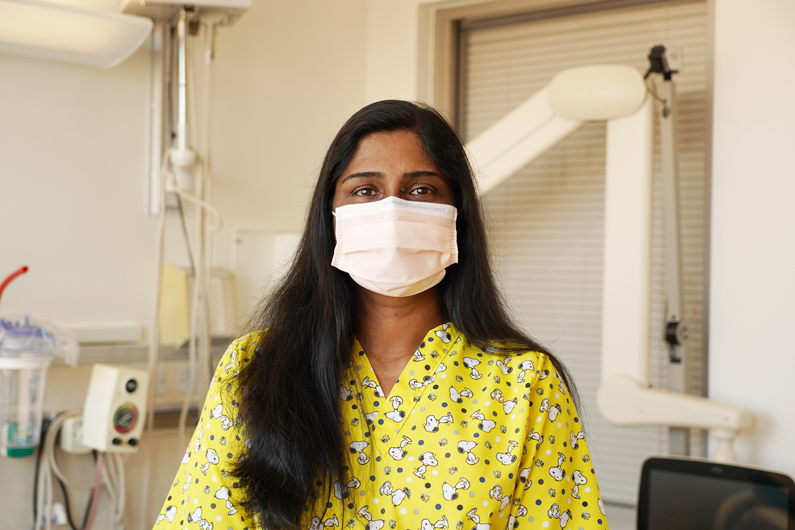Content on this webpage is provided for historical information about the NIH Clinical Center. Content is not updated after the listed publication date and may include information about programs or activities that have since been discontinued.
Since 1953 the NIH Clinical Center has been through a lot of change – building size, clinical trial designs, therapeutic approaches – but one aspect of clinical research that has remained constant and vital to patient care is the nurses at the bedside of every patient. This year, the NIH and healthcare institutions around the globe are celebrating "The Year of the Nurse and Midwife" – a designation set for 2020 by The World Health Organization (WHO). Announced in 2019, long before the pandemic, the WHO wanted to memorialize the 200th birthday of Florence Nightingale, one of the founders of modern nursing and pioneers who identified the importance of hand washing and infection control.
Dr. Gwenyth Wallen, Chief Nursing Officer at the NIH Clinical Center, said "I can't help thinking that Florence would be proud of how far we have come as a discipline and how much the fight against COVID-19 often mirrors the need for what she exemplified as she cared for soldiers in the Crimean War so many years ago: leadership, compassion, love, discipline and courage."
Wallen leads a team of roughly 540 nurses whose work also intersects with an additional 425 nurses across the NIH Institutes.
The WHO designation was very exciting and a great honor, Wallen said.
"It just makes nurses feel the pride of having selected a discipline like ours. It's not always easy. We're the 24/7 folks," she said. "We're a really important part of a bigger interdisciplinary team. We offer strength to the enterprise of clinical research nursing through our own discipline of nursing. We approach things and have unique insight and unique ways of understanding our patients and their families that augment the clinical research teams that we work with."
In May 2020, Dr. Francis Collins, director of the NIH, sent an email honoring nurses.
"We see nurses in countless roles here at NIH: caring directly for our patient partners in medical research; serving in leadership positions; coordinating research studies; educating patients, families, and staff; providing clinical services for NIH staff; and leading and conducting cutting-edge scientific research," Collins said. "Since the pandemic reached our shores, our nursing colleagues have not hesitated in their efforts to screen and test NIH patients and staff to ensure our safety. To all of the nurses serving at NIH: I am profoundly grateful for your dedication to our institution, and to your profession and its guiding principles. I know I speak for the entire NIH family when I say thank you, today and every day, for everything you do."
In celebration of The Year of the Nurse and the Midwife, CC News interviewed three Clinical Center nurses with varying backgrounds and positions – but what they share in common, according to Wallen, is that they are able to "put leadership with love and compassion with discipline and courage. In nursing, that's what I think you're called to do is combine these together."
The New Hire

The first moment Alex Castillo, a clinical research nurse resident on the Clinical Center's 1NW Pediatric Unit, witnessed the healing power of nursing was when her childhood friend was diagnosed with leukemia, the most common type of cancer in children. Her friend received chemotherapy treatments and went into remission, but later passed at 20 years old from complications.
"It was the nurses who cared for my friend and came to her funeral and comforted the family that made a lasting impression on me," Castillo stated.
The second eye-opening instance that piqued her interest in nursing came while she was working at Sibley Memorial Hospital in 2016.
"I always wanted to help other people," she said. "The positive nurse-patient relationships I observed as an Audiologist Assistant on the postpartum unit during newborn hearing screening at Sibley ultimately paved the way for me to pursue my nursing degree."
With the steadfast support of her husband, Castillo graduated in May 2019 from the University of Maryland's School of Nursing Clinical Nurse Leader Program. Castillo was the only Latino in her graduating class. According to the Bureau of Labor statistics, there are about 2.9 million registered nurses in the country, and only 3% are Latinos.
She came to the Clinical Center Pediatric Unit in October 2019 as one of ten new graduate nurses in the NIH Clinical Research Nursing Residency Program. As a Latino, Castillo says she wondered how well she would fit in but the staff diversity on the unit was a welcoming sight. Castillo spends her days focused on critical thinking and competency in the clinical research setting while taking patient vitals, physical assessments and administering chemotherapy.
One challenge Castillo had to overcome during her nurse training on the Pediatric Unit was her fear of emotional attachment with her severely or terminally ill pediatric patients in her care and how to find the right balance of compassion.
NIH Clinical Research Nursing Residency Program Coordinator Melanie Mudd says many of her first-year nurses go through the same thing.
"Most nurses will never forget their first year as a licensed nurse – it is one full of excitement and anxiety, as he/she learns to apply the theories and knowledge gained from their nursing coursework on a real person. Being a newly licensed nurse at the Clinical Center, it is especially challenging to navigate the complexities that comes with providing care to research participants on active research protocols," said Mudd.
"While the residency curriculum is built to enhance the nurse residents' clinical skillset, while fostering leadership development and a spirit of inquiry, one of the most critical elements of the program is transition support," Mudd added. "This transition support was especially crucial for Alex and her peers, who have begun their careers during a time of great challenge. It's truly been an honor to witness their compassion and resiliency in action as they care not only for their patients and caregivers at the bedside, but for each other."
As the first anniversary of working as a nurse at the Clinical Center quickly approaches, Castillo aspires to continue to provide the best care and support to her patients and families while working with the nursing care team to implement the clinical research protocols. Castillo summarizes her experience thus far by saying, "Nursing is a calling in addition to a profession, and it is our responsibility to protect and care for our patients while they are at the hospital."
- Mickey Hanlon
The Seasoned CRN

Herman Joseph Fantom, a senior clinical research nurse, has worked at the NIH Clinical Center on 7SWN Neuroscience Unit as a bedside nurse for the past 30 years.
Nursing was not the first career choice for Herman Fantom, who goes by "Joe." His degree was in Psychology, and nursing was not even on his radar. But his mom knew his personality, and advised him that nursing would be a great career. About only 3% of nurses were male at the time, but he went for it, and now says it was the best career decision of his life.
Fantom worked as a nursing assistant for a few years, but discovered that if he wanted a career in health care, it was essential to be licensed. He realized that registered nurses were the ultimate standard for health care, promotion and job security.
In 1985, he obtained his nursing degree at Georgetown University Nursing School. Other than a short stint as an assistant head nurse in the mid-nineties, he has worked as a registered nurse involved in direct patient care ever since. In 1990, Fantom became certified as a Clinical Neuroscience Research Nurse, allowing him to perform a higher level of clinical nursing.
His duties include monitoring patients, administering medications, taking vitals, bathing patients and changing linens, as well as assisting with surgical protocols. Fantom sees his job as not only caring for physical needs, but providing emotional support to aid in the recovery process. He also enjoys his involvement with the preceptor/mentoring program for new nurses, and believes that the highest calling for a nurse is to heal and to teach.
Fantom's wife works as a speech language pathologist at Holy Cross Hospital, the largest, busiest hospital in Montgomery County. Since his wife has had to care for patients with COVID-19, his family has had to deal with the pandemic on a personal level.
"COVID has changed everything about health care," he says. "Those on the frontline who have witnessed this horror have been strongly tested and the medical and ethical trauma will be with them for a long time. This will affect how they care for themselves as well as others."
He notes that the trying and challenging times have led to innovation that has required health care professionals to "think outside the box" and has increased their resiliency. His hope is that healthcare will come out stronger, better organized and more flexible in the future.
Fantom says he feels very blessed and has enjoyed his 35 years as a bedside nurse. He has seen a lot of changes in his years in the field, but feels that healthcare is headed in the right direction.
"I consider it an extreme privilege, honor and responsibility to witness the human condition in all its hope, grief and glory" he said. "Regarding my nursing journey, I wouldn't change a thing."
- Debbie Accame
The Frontline Nurse

Susan Roy knew she wanted to be a nurse early in life after experiencing the impact nurses had on her whole family when her mother underwent cancer treatment.
"I was impressed by how much her nurses – with their life-saving compassionate care – made a difference in her treatment and recovery," said Roy, a senior clinical research nurse on the NIH Clinical Center's Special Clinical Studies Unit (SCSU).
The nurses' ability to intervene for her mother, understand her needs and make her family feel comfortable inspired Roy.
"Right then I knew I wanted to be a nurse to make a difference in patient's lives," Roy said.
Roy worked in post-cardiac catheterization unit at MedStar Washington Hospital Center in Washington, D.C. for 13 years before joining the Clinical Center family in July 2015.
Working at a research hospital like the Clinical Center creates a synergistic and dynamic environment, and the nursing role is fascinating to say the least, Roy said.
As a clinical research nurse, she has an integral role in the clinical trials here: providing and coordinating clinical care, assuring participant safety and ongoing informed consent, maintaining the integrity of protocol implementation, accuracy of data collection and much more.
"Accurate and complete data is extremely important to determine a study outcome."
It's important to pay extra attention to detail when it comes to accurate data collection, data protection, encouraging compliance to protocols, on-going sharing of information regarding the study and helping participants understand their responsibilities," she said.
"I feel I am promoting care, health and wellness not just for Clinical Center patients but for populations across the globe," she added.
The SCSU where Roy works is an inpatient unit designed with state-of-the-art infrastructure that allows for isolation capabilities and infection control while caring for patients with infectious diseases. The SCSU is isolated from the rest of the Clinical Center and the surrounding community via numerous redundant systems and precautions including special air handling systems, cardkey restricted access, separate entrance and exit pathways for staff, including a shower prior to exit, and protocols for handling waste.
The SCSU is equipped to care for patients affected with Bio-Safety Level 4 pathogens. The unit saw to the care of several individuals who were exposed to or diagnosed with Ebola in late 2014-early 2015.
Currently, Roy is involved with COVID-19 inpatient and outpatient care that includes testing for the SARS-CoV-2 virus, transporting persons under investigation, coordinating with epidemiology and other departments, training staff for use of personal protective equipment (PPE), shipping lab samples and bedside care to patients.
"It gives me immense joy to be one of the thousands of nurses across the nation on the frontlines of the pandemic," Roy said.
Being a frontline nurse working with COVID-19 can be intense, but Roy said she is confident in the Clinical Center's epidemic prevention and control strategies.
"The Clinical Center was on the frontlines of Ebola care, and all the staff and patients were safe. That is evidence that speaks for itself," she said.
"In the early stages, I had some anxiety regarding how we would be doing as a unit, if the nationwide PPE shortage would hit us, a possible surge of patients and how staff would handle it," Roy said. "But those emotions faded as I saw our unit doing well, patients getting discharged, no shortage of PPE and staff getting accustomed to the environment."
Being a nurse can be challenging and fraught with emotional tension as patients and their families struggle with sickness sometimes terminally. Nevertheless, her profession is also immensely rewarding, Roy said.
"The rewarding part is the satisfaction I derive from understanding what patients and their loved ones are undergoing and helping them through their most uncertain and difficult times," she said.
For others considering nursing as a career, she has some advice.
"Believe in yourself. Work hard. Be 100 percent dedicated and be prepared to spend weekends with your assignments," she said. "When you feel overwhelmed with the quantity and complexity of school work, tell yourself it will all be worth it in the end because you have chosen the most noble and rewarding profession on the earth for you career."
- Cindy Fisher

